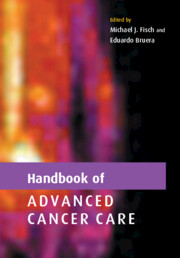Book contents
- Frontmatter
- Contents
- List of contributors
- Preface
- Acknowledgements
- PART I General concepts in oncology
- Part II Primary tumors
- 17 Lung cancer
- 18 Breast cancer
- 19 Colorectal cancer
- 20 Prostate cancer
- 21 Pancreatic and hepatobiliary cancer
- 22 Anal cancer
- 23 Esophageal and gastric cancer
- 24 Head and neck cancer
- 25 Kidney cancer
- 26 Bladder cancer
- 27 Ovarian cancer
- 28 Gynecologic malignancies: endometrial and cervical carcinoma
- 29 Testicular cancer
- 30 Unknown primary site cancer
- 31 Mesothelioma
- 32 Adult soft tissue sarcoma
- 33 Osteosarcoma and Ewing's sarcoma
- 34 Melanoma
- 35 Primary brain tumors
- 36 Thyroid and adrenal cancer
- 37 HIV-related cancer
- 38 Hodgkin's and non-Hodgkin's lymphoma
- 39 Leukemia, myelodysplastic syndrome and myeloproliferative disorder
- 40 Multiple myeloma
- Part III Management of specific symptoms and syndromes
- Index
- References
19 - Colorectal cancer
Published online by Cambridge University Press: 04 August 2010
- Frontmatter
- Contents
- List of contributors
- Preface
- Acknowledgements
- PART I General concepts in oncology
- Part II Primary tumors
- 17 Lung cancer
- 18 Breast cancer
- 19 Colorectal cancer
- 20 Prostate cancer
- 21 Pancreatic and hepatobiliary cancer
- 22 Anal cancer
- 23 Esophageal and gastric cancer
- 24 Head and neck cancer
- 25 Kidney cancer
- 26 Bladder cancer
- 27 Ovarian cancer
- 28 Gynecologic malignancies: endometrial and cervical carcinoma
- 29 Testicular cancer
- 30 Unknown primary site cancer
- 31 Mesothelioma
- 32 Adult soft tissue sarcoma
- 33 Osteosarcoma and Ewing's sarcoma
- 34 Melanoma
- 35 Primary brain tumors
- 36 Thyroid and adrenal cancer
- 37 HIV-related cancer
- 38 Hodgkin's and non-Hodgkin's lymphoma
- 39 Leukemia, myelodysplastic syndrome and myeloproliferative disorder
- 40 Multiple myeloma
- Part III Management of specific symptoms and syndromes
- Index
- References
Summary
Introduction
Cancers of the rectum and colon (CRC) collectively make large bowel malignancy the third-most frequently diagnosed non-skin neoplasm in Americans. Since males do not commonly expire from breast cancer, and females never die from prostate malignancies, CRC is the second biggest cancer killer of Americans. The risk for developing CRC dramatically increases with age up until the 80s, and the lifetime chance of developing large bowel cancer is about 6%.
Worldwide, incidence rates vary more than 10-fold between low- and high-risk areas. Mortality has been decreasing in many countries, including the US, though it has recently increased in China and Japan. It seems likely that environmental exposures (and not some kind of genetic protection) account for much of the difference in incidence rates, since offspring of migrants from low-risk countries have incidence rates approaching those of native residents of the high-risk areas.
About 15% of patients will present with metastatic disease. Of those with localized tumors undergoing potentially curative surgery, one-third to one-half will recur, depending on stage. Thus, approximately half of all patients with CRC will eventually be diagnosed with metastatic disease.
Anatomy and histology
The large bowel is divided between colon and rectum, though prognostic and treatment differences for cancers arising from each are more striking for early-stage disease. Resected tumors are usually considered to have arisen from the colon if they are located above the peritoneal reflection, and to be rectal in origin if they arose at or below this anatomic landmark or the lower edge of the tumor was within 12 cm of the anal verge, as measured on rigid proctoscopy.
- Type
- Chapter
- Information
- Handbook of Advanced Cancer Care , pp. 162 - 170Publisher: Cambridge University PressPrint publication year: 2003



